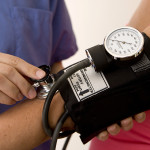By Bonnie Jenkins, Advanced Natural Wellness
High blood pressure can sneak up on you—and, unless you get regular check-ups, you may not even know you have it. That’s because high blood pressure—also known as hypertension—doesn’t have any symptoms.
Because hypertension is largely a “silent” disease, it’s important to get your blood pressure checked at least once a year, starting at age 40.
Blood pressure refers to the force of blood against your artery walls. When this pressure becomes too great, the arterial walls may narrow or thicken, putting an extra burden on the heart. A blood pressure level of 140/90 or greater is considered high. Systolic pressure—the first number in a blood pressure reading—represents the amount of pressure on the artery walls.
MD Exposes the Hidden Danger to Your Eyes

When your eyesight starts to fail, it's a real problem. Suddenly you can't go to the grocery store... you can't get to the doctor if you have an emergency... you can't meet your friends for dinner…
Your "regular" doctor doesn't have time to keep up with the latest research. And the same goes for eye doctors. They go to school to learn how to fit you for glasses and contacts, but have no way of preventing the damage and loss of eyesight that threatens your freedom and independence.
Let me show you something that explains a LOT about how your eyes work.
In my FREE Special Report, I'll show you a HUGE, untapped resource for your eyes that safely and naturally restores clear, effortless eyesight.
Click here to get started...
The second number, or diastolic pressure, represents the lowest level of pressure. If your blood pressure reaches between 120/80 and 139/89, you have a condition called pre-hypertension. This means that, while you don’t have high blood pressure yet, you may develop it unless you adopt a healthier lifestyle.
Why is high blood pressure so very dangerous? Because it is the leading cause of heart attack and stroke. If your blood pressure is too high, your heart has to work harder, and you may eventually develop atherosclerosis. High blood pressure can also result in other conditions like kidney disease, diabetes, blindness and congestive heart failure.
But the news isn’t all bad. New findings from the second Nurses’ Health Study show that adopting six key dietary and lifestyle habits can reduce the risk of high blood pressure by an incredible 80 percent! So what are the six secret blood pressure soothers pinpointed by the researchers at Harvard and Brigham and Women’s Hospital? The first—and the one with the most impact—is to keep your weight in check. Specifically, you need to make sure your body mass index (BMI) is under 25. Your BMI is a measure of body fat based on height and weight. To find out if you are over or under 25, simply multiply your weight in pounds by 704.5. Then multiply your height in inches by your height in inches, and divide the first answer by the second answer. If you top 25, don’t fret. Losing just five percent of your body weight can slash your blood pressure levels.
Are You Suffering From...
- Love handles and a pot belly
- Romance that isn't what it used to
- Forgetfulness and inattention
- Low (or no) strength and endurance
- A sex drive that's shifted into neutral...or worse
If so...you may have Mature Male Burnout. Click here to discover more about this unique condition and what you can do about it.
Two of the other hypertension-lowering strategies can help you accomplish this. The research team notes that getting 30 minutes of vigorous exercise daily and adhering to a low-sodium diet like the Dietary Approaches to Stop Hypertension (DASH) diet can not only help you lose weight, they both have a lowering effect on blood pressure. The DASH diet isn’t just low in sodium, it is also high in fiber from whole grains, beans, fresh fruits and vegetables. It’s also rich in potassium, which has blood pressure lowering effects. Some good sources of potassium include fish, dairy foods, lima beans, bananas, oranges, raisins and tomatoes.
Tomatoes not only contain potassium but also lycopene. A double-blind, placebo-controlled study of hypertension patients finds that lycopene, an antioxidant-rich extract, significantly lowers both diastolic and systolic blood pressure.
Like salt, the Nurse’s Health Study suggests that alcohol should also be consumed in moderation. Studies show that heavy drinking—by itself—can cause your blood pressure to skyrocket. If you already have hypertension or are at an increased risk, you may want to skip the liquor altogether. Ditto for pain relievers like acetaminophen (Tylenol) or ibuprofen (Advil or Motrin).The study showed that the subjects who used these drugs less than once a week had a lower risk of high blood pressure.
Finally, taking 400 mcg. or more of supplemental folic acid every day was also important for keeping high blood pressure at bay. Note that the study didn’t say dietary folate—the type of folic acid found naturally in foods. Oh no, the researchers specified folic acid supplements. It’s not the first time folic acid has been highlighted for healthy blood pressure. Earlier studies show that people who consume at least 1,000 mcg. of total folate daily from both food and supplements had a 46 percent lower risk of hypertension than those consuming less than 200 mcg. a day.
If you’re at a high risk of hypertension, these six lifestyle changes can literally save your life. But, if you want lasting change, try adopting just one or two of these strategies at a time instead of shooting for wholesale changes all at once. That’s a surefire recipe for failure. Making these changes gradually, on the other hand, supports not only healthy blood pressure levels but your overall health, too!
References:
Chen L, et al. Alcohol and blood pressure: A systematic review implementing a mendelian randomization approach. PLoS Medicine. 2008;5: e52.
Fogari R. Hypertention: Blood Pressure Basics. American Heart Association’s 61st Annual Fall Conference of the Council for High Blood Pressure Research, Tucson, Ariz., Sept. 26-29, 2007.
Forman JP, et al. Diet and Lifestyle Risk Factors Associated With Incident Hypertension in Women. Journal of the American Medical Association. 2009; 302:401-411.
Klatsky AL. Alcohol-Associated Hypertension. Hypertension. 2004;44:805






